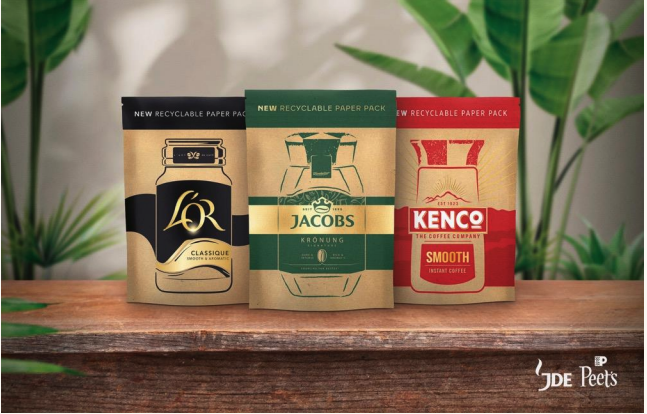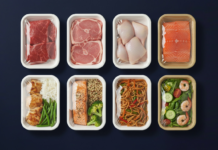
In 2023, Amsterdam-headquartered JDE Peet’s announced that it was accelerating its sustainability agenda with a breakthrough recyclable paper refill pack for three soluble or instant coffee brands. These included the century-old Kenco coffee brand in the UK and Ireland.
Strictly by chance, on my visit to the UK after drupa24, a friend asked me to carry some of the new paper-based Kenco coffee refill packs back to India for another friend. Now widely available in UK supermarkets such as Tesco and Sainburys, the coffee from this new paper pack is claimed to generate the lowest carbon footprint within the existing range of JDE Peet’s products.
Designed to create a more sustainable ecosystem in the instant coffee market by incentivizing the reuse of existing glass jars and tin containers, the new pack is made of over 85% paper – making it disposable in home recycling bins and paper waste streams. It is claimed to keep the soluble coffee fresh for 15 months to ensure that the new, sustainability-minded packaging design doesn’t impact the taste and quality of the product. The sustainable and recyclable paper packs replace existing and commonly used PET/ALU/PE solutions used for instant coffee.
The new packaging replaces the earlier plastic packaging for Kenco and Douwe Egberts and, for the first time, takes the L’OR brand into a refill format across major retailers in the UK and Ireland. When the new packaging was announced last year, Fabien Simon, CEO of JDE Peet’s, commented, “We know that reducing packaging and promoting recyclability and reusability are increasing consumer needs. By providing more sustainable solutions within soluble coffee, one of the world’s most beloved and consumed beverages, we can maximize our positive contribution in decarbonizing our own portfolios and the coffee market as a whole.”
JDE Peet’s is working to reduce the amount of packaging material and associated carbon emissions, used in manufacturing, transport, and end-of-life disposal. The innovative new paper pack developed in collaboration with a leading European flexible packaging converter supports the company’s effort of minimizing its carbon footprint across its entire value chain and its goal of moving towards 100% of packaging designed to be reusable, recyclable, or compostable by 2030. In line with this, in 2022, JDE Peet’s set targets validated by the Science Based Targets initiative (SBTi) to reduce emissions across scopes 1, 2 and 3.
Packaging Europe reported that Kenco was perhaps the first coffee brand to launch a refill format in 2009. It went on to quote Roberto De Felice, JDE Peet’s marketing director for UK & Ireland, “Research shows consumers want to embrace reusable and refillable packaging, 76% of shoppers are looking to recycle more – but ‘ease of recycling’ can be a significant barrier.
Coffee, which requires high-quality packaging to retain its flavor is a premium commodity, probably one of the most expensive branded products available in supermarkets, along with certain teas and spices. As widely experienced in the current year, from Latin America to Africa and Asia, including India, coffee is also one of the first crops to be threatened by climate change. A product that attracts a variety of expensive machines and methods of delivery and fresh brewing, coffee invites more sustainable solutions. The premiumization of coffee increasingly demands that it be a sustainable and ethical product from plantation to processing and delivery.
IndiFoodBev — authentic, impactful and influential
An English-language food and beverage processing and packaging industry B2B platform in print and web, IndiFoodBev is in its third year of publication. It is said that the Indian food and beverage industries represent approximately US$ 900 billion in revenues which implies more than 20% of the country’s GDP. Eliminating the wastage on the farmside can help to deliver more protein to a higher number of the population apart from generating sizable exports. The savings in soil, seeds, water, fertilizer, energy and ultimately food and nutrition could be the most immense contribution that country is poised to make to the moderation of climate change.
To improve your marketing and grow sales to the food and beverage processing and packaging industry, talk to us. Our research and consulting company IppStar [www.ippstar.org] can assess your potential and addressable markets in light of the competition. We can discuss marketing, communication, and sales strategies for market entry and growth.
Suppliers and service providers with a strategy and budget for targeted marketing can discuss using our hybrid print, web, video, and social media channels to create brand recognition linked to market relevance. Our technical writers are ready to meet you and your customers for content.
The second largest producer of fruit and vegetables in the world is continuously expanding processing capacities and delivery systems with appropriate innovative technologies. We cover product and consumer trends, nutrition, processing, research, equipment and packaging from farm to thali. Get our 2025 media kit and recalibrate your role in this dynamic market. Enhance your visibility and relevance to existing markets and turn potential customers into conversations. Ask for a sample copy of our bi-monthly in print or our weekly IndiFoodBev eZine each Wednesday.
For editorial info@ippgroup.in — for advertisement ads1@ippgroup.in and for subscriptions subscription@ippgroup.in
Naresh Khanna – 10 February 2025
Subscribe Now










